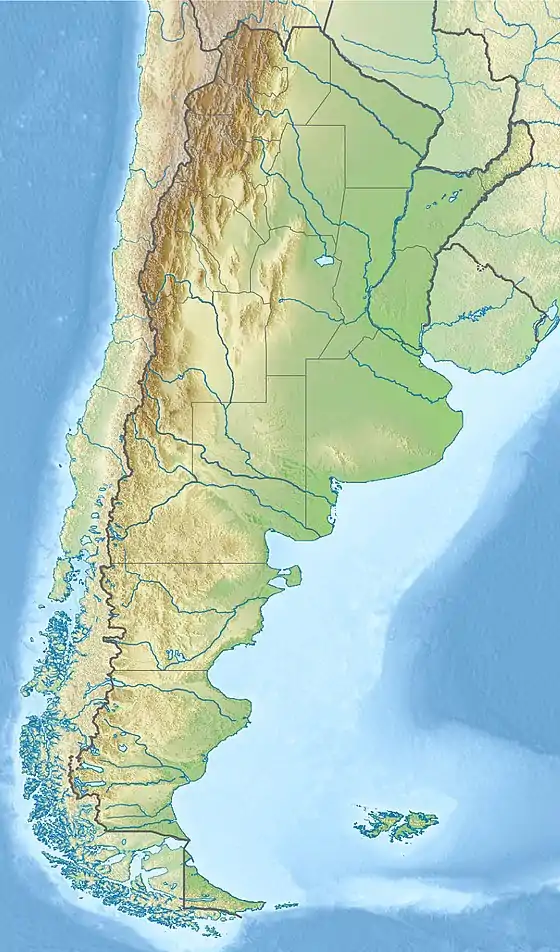Los Rastros Formation
The Los Rastros Formation is a Ladinian to Carnian fossiliferous formation of the Agua de la Peña Group in the Ischigualasto-Villa Unión Basin in northwestern Argentina. Fossil theropod tracks,[1] as well as many insects, fossil fish of Myriolepis,[2] bivalves and crustaceans and flora have been reported from the formation.
| Los Rastros Formation Stratigraphic range: Carnian 234.91–234.03 Ma | |
|---|---|
| Type | Geological formation |
| Unit of | Agua de la Peña Group |
| Underlies | Ischigualasto Formation |
| Overlies | Chañares Formation |
| Thickness | Up to 1,000 m (3,300 ft) |
| Lithology | |
| Primary | Claystone, sandstone |
| Other | Mudstone |
| Location | |
| Coordinates | 29.1°S 69.1°W |
| Approximate paleocoordinates | 45.8°S 34.9°W |
| Region | La Rioja & San Juan Provinces |
| Country | |
| Extent | Ischigualasto-Villa Unión Basin |
 Los Rastros Formation (Argentina) | |
Description
The formation overlies the Chañares Formation (and/or the Ischicuca Formation), and is overlain by the Ischigualasto Formation.[3] The formation belongs to the Agua de la Peña Group of the Ischigualasto-Villa Unión Basin, where it is exposed in the Ischigualasto Provincial Park, a World Heritage site in Argentina.[4] The up to 1,000 metres (3,300 ft) thick formation of claystones, mudstones and sandstones was deposited in a deltaic to lacustrine environment during the first post-rift sequence in the basin.[3][5]
A CA-TIMS U-Pb zircon age of 234.47 ± 0.44 Ma from the lower Los Rastros Formation was published in 2020. The acquired age demonstrates that most of the overlying lacustrine strata within the basin were deposited during or after the Carnian Pluvial Event (CPE) that lasted from 237 to 227 Ma approximately.[6]
Fossil content
The following fossils among others have been recovered from the formation:[5]
- Fish
- Myriolepis sp.[2]
- Insects
Blattoptera (cockroaches and their relatives)
- Argentinoblatta herbsti[7]
- Argentinoblattula revelata[8]
- Condorblatta lutzae[7]
- Hermosablatta crassatella
- Hermosablatta pectinata[9]
- Lariojablatta chanarensis[10]
- Mancusoblatta pulchella[11]
- Pulchellablatta nana[12]
- Samaroblatta corrientesina[12]
- Samaroblatta gualoensis[13]
- Triassoblatta argentina[10]
Coleoptera (beetles and their relatives)
- Argentinocupes pulcher
- Argentinosyne bonapartei
- Babuskaya elaterata
- Ischichucasyne cladocosta
Hemiptera (true bugs and their relatives)
- Saaloscytina carmonae
Unknown
- Miomina riojana
- Crustaceans
- Bivalves
- Paleomutella sp.[2]
- Flora
- Ichnofossils
- Rigalites ischigualastensis[2]
- Prestosuchidae[14]
See also
- List of dinosaur-bearing rock formations
- Chañares Formation
- Santa Maria Formation
- Omingonde Formation
References
- Weishampel et al., 2004, pp. 517-607
- Leonardi, 1994, p.20
- Aceituno Cieri, 2015, p.60
- Kent et al, 2014, p.7959
- Los Chañares at Fossilworks.org
- Mancuso et al., 2020
- Martins Neto et al., 2005, p.5
- Martins Neto et al., 2005, p.16
- Martins Neto et al., 2005, p.10
- Martins Neto et al., 2005, p.12
- Martins Neto et al., 2005, p.8
- Martins Neto et al., 2005, p.14
- Martins Neto et al., 2005, p.13
- Leonardi, 1994, p.21
Bibliography
- Aceituno Cieri, P.; M.E. Zeballos; R.J. Rocca; R.D. Martino, and C. Carignano. 2015. Condicionantes geológicos en el cruce de la sierra de Valle Fértil. San Juan - Geological constraints at the crossing of sierra Valle Fertil. San Juan. Revista de Geología Aplicada a la Ingeniería y al Ambiente 35. 57–69.
- Kent, Dennis V.; Paula Santi Malnis; Carina E. Colombi; Oscar A. Alcober, and Ricardo N. Martínez. 2014. Age constraints on the dispersal of dinosaurs in the Late Triassic from magnetochronology of the Los Colorados Formation (Argentina). Proceedings of the National Academy of Sciences 111. 7958–7963. Accessed 2018-09-08.
- Leonardi, Giuseppe. 1994. Annotated Atlas of South America Tetrapod Footprints (Devonian to Holocene) with an appendix on Mexico and Central America, 1–248. Ministerio de Minas e Energia - Companhia de Pesquisa de Recursos Minerais, Geological Service of Brazil. Accessed 2019-03-25.
- Mancuso, Adriana C.; Cecilia A. Benavente; Randall B. Irmis, and Roland Mundil. 2020. Evidence for the Carnian Pluvial Episode in Gondwana: New multiproxy climate records and their bearing on early dinosaur diversification. Gondwana Research in press. . doi:10.1016/j.gr.2020.05.009
- Martins Neto, R.G.; A. Mancuso, and O.F. Gallego. 2005. The Triassic Insect Fauna from Argentina. Blattoptera from the Los Rastros Formation (Bermejo Basin), La Rioja Province. Ameghiniana 42. 1–21. Accessed 2019-03-28.
- Weishampel, David B.; Peter Dodson, and Halszka Osmólska (eds.). 2004. The Dinosauria, 2nd edition, 1–880. Berkeley: University of California Press. Accessed 2019-02-21.ISBN 0-520-24209-2